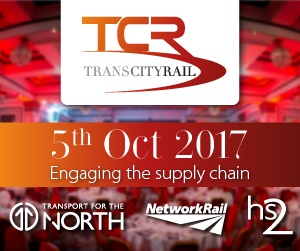17.07.17
Major players win big as HS2 awards £6.6bn construction contracts
A number of high-profile joint ventures (JVs) have been revealed as the winners of £6.6bn worth of major construction and civil engineering contracts for the first phase of HS2 between London and Birmingham.
In March last year, the tender for the main civil engineering works contracts, comprising bridges, tunnels, embankments and viaducts, was released. And today’s announcement includes decisions on the first and second stages of the big construction contracts.
The total value of these contracts, including both Stage 1 and Stage 2, is estimated to be worth £6.6bn. Stage 2 will commence in 2019 and, along with Stage 1, is expected to support 16,000 jobs across the country.
Sir David Higgins, chairman of HS2 Ltd, said: “HS2 was always designed to be much more than just a high-speed railway and today we can see the opportunities it brings right around the country – spreading prosperity, acting as a catalyst for investment and rebalancing our economy 10 years before the railway even opens.
“Business now has the surety to invest with confidence to build a legacy for Britain.”
The winning bidders to build the first phase of the route are:
Area South
- Euston Tunnels and Approaches – SCS JV (Skanska Construction UK Ltd, Costain Ltd, STRABAG AG)
- Northolt Tunnels – SCS JV (Skanska Construction UK Ltd, Costain Ltd, STRABAG AG)
Area Central
- Chiltern Tunnels and Colne Valley Viaduct – Align JV (Bouygues Travaux Publics, VolkerFitzpatrick, Sir Robert McAlpine)
- North Portal Chiltern Tunnels to Brackley – CEK JV (Carillion Construction Ltd, Eiffage Genie Civil SA, Kier Infrastructure and Overseas Ltd)
- Brackley to South Portal of Long Itchington Wood Green Tunnel – CEK JV (Carillion Construction Ltd, Eiffage Genie Civil SA, Kier Infrastructure and Overseas Ltd)
Area North
- Long Itchington Wood Green Tunnel to Delta Junction and Birmingham Spur – BBV JV (Balfour Beatty Group Ltd, VINCI Construction Grands Projets, VINCI Construction UK Ltd, VINCI Construction Terrassement)
- Delta Junction to WCML Tie-In – BBV JV (Balfour Beatty Group Ltd, VINCI Construction Grands Projets, VINCI Construction UK Ltd, VINCI Construction Terrassement)
After being awarded contracts worth a total of £2.5bn, Mark Cutler, BBV JV managing director for HS2, said: “I am proud that our long-standing joint venture has been chosen to deliver these two integral sections of HS2.
“This iconic rail infrastructure project will create significant opportunities for the UK construction industry and will drive growth in skills, jobs and prosperity. We look forward to building on our successful track record delivering high profile projects, and help to engineer Britain’s second great railway age.”

The JV will deliver Lot N1, valued at circa £1.32bn, and Lot N2, valued at circa £1.15bn, between the Long Itchington Wood Green tunnel to the Delta Junction/Birmingham Spur and from the Delta Junction to the West Coast Main Line tie-in respectively, in a two-part design and build contract.
Carillion, one of Network Rail’s top suppliers, stated that as part of the CEK JV it was delighted to have been selected to deliver two of the three Central contracts for HS2 Phase 1.
The JV has been allotted Lot C2: North Portal Chiltern Tunnels to Brackley £724m; and Lot C3 - Brackley to Long Itchington Wood Green Tunnel South Portal £616m.
All the packages have been let as two-part design and build contracts, to “encourage innovation and flexibility” in delivery and collaboration across the supply chain and with HS2 Ltd.
Keith Cochrane, interim CEO at Carillion, said: “Carillion is a leading supplier of infrastructure services with top two positions in both the UK rail and highways sectors, where we work in partnership with key customers, including Network Rail, Highways England and HS2.
“We expect the UK government’s objective of generating economic growth through investing in infrastructure to continue creating opportunities for us to grow our business in these core markets.”
Shot in the arm
Following the announcement of the deals, TUC deputy general secretary Paul Nowak said: “This is a shot in the arm for Brexit Britain. It will provide thousands of decent jobs, billions in investment, and help close the north-south divide.
“HS2 is a real opportunity for British steel to shine. The next phase of HS2 should bring jobs and investment to the parts of Britain that need them most.”
In February, Parliament granted powers to construct Phase 1 from London Euston to Birmingham, with the route opening in 2026.
Transport secretary Chris Grayling argued that this is a hugely important step in the construction of Britain’s new railway and underlined the government’s determination to deliver an economy that works for all.
“HS2 will deliver vital links between some of our country’s biggest cities, helping to drive economic growth and productivity in the north and midlands,” said Grayling.
He added that later today he will be introducing a bill to Parliament seeking the necessary powers to construct Phase 2a of HS2, from West Midlands to Crewe. Phase 2a will bring HS2 within reach of all the cities in the north that have existing rail connections to Crewe.
HS2 Ltd also revealed the names of the designers and engineers who are formally in the running to develop detailed plans for three brand new stations and majorly expand London Euston.